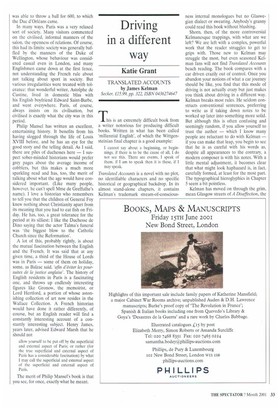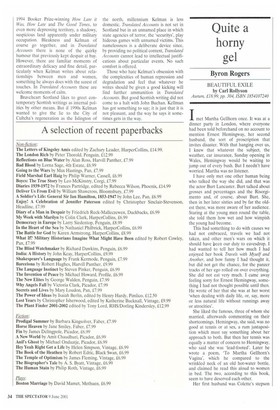Driving in a different way
Katie Grant
TRANSLATED ACCOUNTS by James Kelman
Seeker, £15.99, pp. 322, ISBN 0436274647
his is an extremely difficult book from a writer notorious for producing difficult books. Written in what has been called 'millennial English', of which the Wittgensteinian final chapter is a good example: I cannot say about a beginning, or beginnings, if there is to be the cause of all, I do not see this. There are events, I speak of them. if I am to speak then it is these, if I may speak,
Translated Accounts is a novel with no plot, no identifiable characters and no specific historical or geographical backdrop. In its almost stand-alone chapters, it contains Kelman's trademark stream-of-conscious ness internal monologues but no Glaswegian dialect or swearing. Anybody's granny could read this book without blushing.
Shorn, then, of the more controversial Kelmanesque trappings, with what are we left? We are left with a complex, powerful work that the reader struggles to get to grips with. Those new to Kelman may struggle the most, but even seasoned Kelman fans will not find Translated Accounts beach reading. The book compares with a car driven crazily out of control. Once you abandon your notions of what a car journey should be like, you find that this mode of driving is not actually crazy but just makes you think about driving in a different way. Kelman breaks most rules. He seldom constructs conventional sentences, preferring to write as if taking down notes to be worked up later into something more solid. But although this is often confusing and seemingly random, if you allow yourself to trust the author — which I know many people are reluctant to do with Kelman — if you can make that leap, you begin to see that he is as careful with his words as, despite all appearances to the contrary, a modern composer is with his notes. With a little mental adjustment, it becomes clear that what might look haphazard is, in fact, carefully formed, at least for the most part. The typographical hieroglyphics in Chapter 5 seem a bit pointless.
Kelman has moved on through the grim, mean Glasgow streets of A Disaffection, the 1994 Booker Prize-winning How Late it Was, How Late and The Good Times, to even more depressing territory, a shadowy, suspicious land apparently under military occupation. Bleakness and Kelman of course go together, and in Translated Accounts there is none of the quirky humour that previously kept despair at bay. However, there are familiar moments of extraordinary delicacy and fine detail, particularly when Kelman writes about relationships between men and women, something he always does with the surest of touches. In Translated Accounts these are welcome moments of calm.
Bravehe art Scotland likes to greet contemporary Scottish writings as internal politics by other means. But if 1990s Kelman wanted to give the lie to the City of Cultcha's regeneration as the Islington of the north, millennium Kelman is less domestic. Translated Accounts is not set in Scotland but in an unnamed place in which state agencies of terror, the 'securitys', play hideous games with unnamed victims. This namelessness is a deliberate device since, by providing no political context, Translated Accounts cannot lead to intellectual justifications about particular events. No such comfort is offered.
Those who hate Kelman's obsession with the complexities of human repression and degradation and feel that whatever he writes should be given a good kicking will find further ammunition in Translated Accounts. But good Scottish writing did not come to a halt with John Buchan. Kellman has got something to say; it is just that it is not pleasant, and the way he says it sometimes gets in the way.



































































 Previous page
Previous page